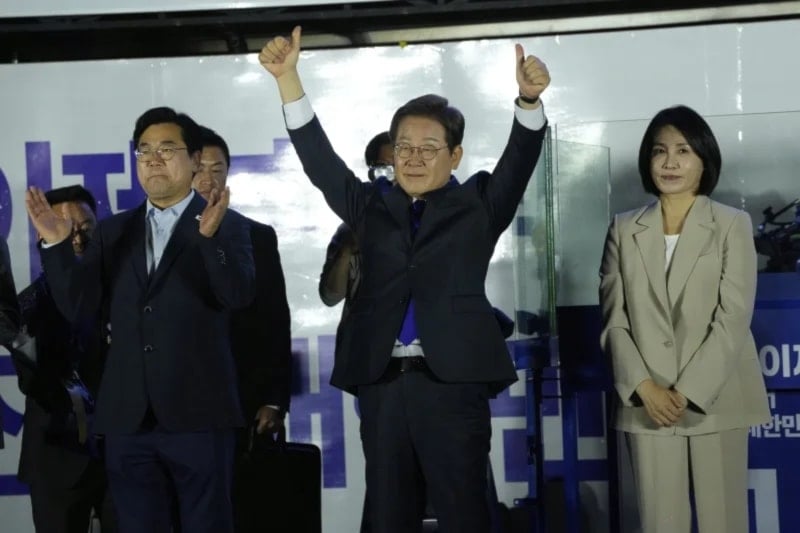South Korea's Lee Jae-myung takes office, vows outreach to DPRK
South Korea’s new president Lee Jae-myung has vowed to “heal wounds” with the DPRK and pursue peace through dialogue, following his landslide win in a snap election.
-

South Korea’s Democratic Party’s presidential candidate Lee Jae-myung, center, and his wife Kim Hea Kyung, right, greet supporters outside of the National Assembly in Seoul, South Korea, Wednesday, June 4, 2025 (AP)
South Korea’s new president, Lee Jae-myung, assumed office on Wednesday following a decisive victory in a snap election and pledged to "heal the wounds" of division on the Korean Peninsula. In his first remarks, Lee emphasized peace through dialogue with the nuclear-armed Democratic People's Republic of Korea (DPRK) and warned of looming economic threats tied to rising global protectionism.
Lee, a center-left politician, won 49.4% of the vote, surpassing conservative Kim Moon-soo’s 41.2%, in a high-stakes election triggered by the downfall of his predecessor, Yoon Suk Yeol, who had declared martial law before his ouster. Lee’s victory took immediate effect, granting him command of the country’s armed forces as tensions persist with Pyongyang.
Upon certification of the vote early Wednesday, South Korea’s new president Lee Jae-myung formally took control of the military and held a call with the top commander, instructing forces to remain on alert in the event of provocations from the DPRK. Nonetheless, Lee made clear his administration’s intention to pursue a peaceful path.
“We will heal the wounds of division and war and establish a future of peace and prosperity,” he said during his inauguration at the National Assembly. “No matter how costly, peace is better than war.”
New president pledges dialogue with DPRK
Lee’s remarks mark a shift from the hardline stance of former president Yoon, who prioritized military deterrence and imposed conditions on engagement. Lee instead promised to “deter North Korean nuclear and military provocations while opening communication channels and pursuing dialogue and cooperation to build peace on the Korean Peninsula.”
Experts say Lee Jae-myung’s DPRK policy signals a significant departure from past rhetoric. According to Hong Min of the Korea Institute for National Unification, Lee's lack of preconditions for talks reflects “his desire to resolve disagreements through talks.”
In addition to addressing inter-Korean relations, Lee highlighted external economic risks facing South Korea. Just hours after he took office, the United States imposed a 50% tariff on South Korea’s steel and aluminum exports, threatening the nation's key industrial sector.
“The rapid changes in the global order such as rising protectionism and supply chain restructuring pose a threat to our very survival,” Lee said, signaling that his administration will prioritize economic security and competitiveness in an increasingly volatile trade environment.
Markets responded positively to the political transition. The KOSPI index and the South Korean won both rose on Wednesday, reflecting investor optimism.
International reactions welcome Seoul’s leadership shift
World leaders began offering congratulations shortly after Lee's swearing-in. US President Donald Trump is expected to be among the first to speak with the new South Korean president.
Chinese President Xi Jinping congratulated Lee on Wednesday and expressed Beijing’s commitment to deepening bilateral ties, according to Chinese state media.
In remarks reported by state broadcaster CCTV, Xi emphasized the strategic value of the relationship amid a shifting geopolitical landscape.
“Uncertainties are increasing in the international and regional situation,” Xi told Lee, adding, “I attach great importance to the development of China-South Korea relations.”
Trump’s secretary of state, Marco Rubio, issued a statement praising the “ironclad” alliance between Washington and Seoul, citing shared values and economic ties.
In a message to Yonhap news agency, the White House called the election “free and fair,” while also voicing concerns over “Chinese interference and influence in democracies around the world.”
Although no concrete evidence has been presented, conspiracy theories about Chinese political meddling have circulated in South Korea in recent months.
Japanese Prime Minister Shigeru Ishiba also extended congratulations, expressing a desire to “energize cooperation” with Seoul. Indian Prime Minister Narendra Modi posted on X that he looked forward to “strengthening ties” with South Korea under Lee’s leadership.
South Koreans hope for national unity and peace
Lee enters office with a strong legislative mandate, as his party holds a parliamentary majority that will remain intact for at least three years. This political capital is expected to help him advance his policy agenda without significant obstruction.
Public reaction on the streets of Seoul reflected cautious optimism. “Since our economy and many other aspects of society are closely linked to the state of inter-Korean relations, I hope we can take a long-term perspective and move in a more positive direction,” said Choi Ki-ho, a 55-year-old resident.
Lee Ju-yeon, a 42-year-old public sector employee, echoed the sentiment, saying, “I hope he will devote himself to uniting our divided nation.”

 5 Min Read
5 Min Read










